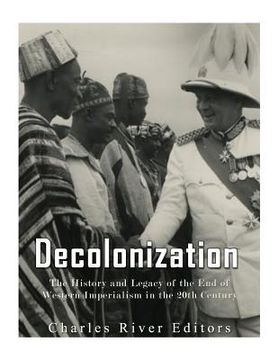Decolonization: The History and Legacy of the End of Western Imperialism in the 20th Century (en Inglés)
Reseña del libro "Decolonization: The History and Legacy of the End of Western Imperialism in the 20th Century (en Inglés)"
*Includes pictures *Includes contemporary accounts *Includes online resources and a bibliography for further reading " [But] in the administration of Kenya His Majesty's Government regard themselves as exercising a trust on behalf of the African population, and they are unable to delegate or share this trust, the object of which may be defined as the protection and advancement of the native races." - Lord Devonshire, British Colonial Secretary, 1929 The U.S. Naval Station Argentia, located in Placentia Bay, a sheltered harbor on Newfoundland Island, was the unlikely setting for one of the most pivotal summit meetings of the 20th century. The meeting took place on August 9, 1941. World War II was in its second year, the British had won the Battle of Britain, but were still encircled by German U-Boats, and the British fleet was being decimated in the North Atlantic. In North Africa, a contest of armor was underway as Axis and Allied armies fought for control of Egypt, while Britain and her Commonwealth allies stood alone against the mighty German Wehrmacht. The British desperately needed more U.S. armaments and supplies, but most importantly, for the U.S. to throw its lot in with the Allies and join the war. In January of that year, President Franklin D. Roosevelt was sworn into office for his third term, realizing at last that U.S. isolationism was no longer a practical policy in a rapidly changing world. Roosevelt made no secret of his support for Britain and China, but grounds for bringing the United States into the war would not fully come until December 7, 1941, when the Japanese launched their infamous surprise attack on Pearl Harbor. Roosevelt, however, pictured a very different post-war world than his British counterpart, Winston Churchill. When he and Churchill met at what came to be known as the Atlantic Conference, Churchill's pleas for U.S. manpower and aid were accepted, but only under clear conditions. If the United States was to come to the aid of Britain, it would be for the purpose of defeating the Germans and the Japanese and not to support the insupportable institutions of empire. Britain and, by extension, France and Portugal, the only remaining major European shareholders in foreign empire, would have to commit to decolonization as a basic prerequisite of substantial U.S. assistance. Churchill, a vocal and forceful proponent of empire and a man of the generation that had conquered the world, did not receive this news well. On the other side of the world, British and allied European Asian colonies lay very much in the path of the Japanese imperial march into Southeast Asia. However, as the inevitability of war grew daily, the nationalist movement in India was also beginning to gather pace. Without India and Indian manpower, war with Japan would be lost before it could begin. The Indians in a sense could hold the British hostage, and ultimately, in exchange for Indian cooperation in the war, the British would first have to commit to a post-war independence process. Churchill wished to offer no encouragement to the Indians in this objective, nor to any other restive colonial territory encouraged to do the same, but in the end, he had no choice. In a somber ceremony held on August 14, 1941, he added his signature alongside Roosevelt's to a document that came to be known as the Atlantic Charter. Implicit in this declaration was a "New World Order," under which European colonialism would end, and independence, sovereignty, and self-determination would be basic rights for all people and nations. It was indeed a New World Order, the founding of a new age, but perhaps its most salient feature was less the advent of universal freedom than the decline of Britain as the leading world power and the emergence of the United States in its place.

